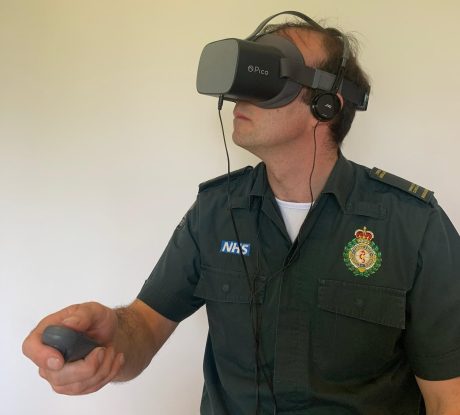Ambulance crews use hard-hitting virtual reality to better spot signs of sexual abuse and domestic violence
Ambulance crews are using virtual reality (VR) headsets to immerse themselves in traumatic situations such as domestic violence to better prepare them for real-life situations where vulnerable people are in need of help.

London Ambulance Service (LAS) has developed training using headsets which are loaded with true-to-life scenarios to help clinicians understand the impact of various types of abuse and trauma on the physical and mental wellbeing of vulnerable adults and children.
The simulated scenarios include scenes of domestic violence, sexual exploitation, drug abuse, child grooming, modern slavery and gang intimidation and give users a 360 degree view.
Trigger warning: video below shows actors depicting a domestic abuse and child neglect scenario, seen from the child’s perspective.
Alan Taylor, Head of Safeguarding, said: “The immersive experience allows ambulance staff to see things from a patient’s perspective and to help understand the fear so they truly empathise with their patient.
“This gives our crews a greater understanding of how vulnerable patients may display signs of trauma and means they can better protect children and adults at risk.”
Ambulance clinicians are often the first people to identify a vulnerable adult or child and they make safeguarding referrals to the appropriate agency if they are concerned about abuse or neglect.
LAS is the first ambulance service in the country to use the technology for safeguarding training.
Paramedic Patrick Hunter (pictured) said: “I thought I was unshockable but this was really sobering to watch. I was shocked but necessarily so. Seeing things from a child’s perspective helps us to understand how integral safeguarding is to our practice.
“Sometimes children won’t engage with us or might seem rude but this training shows that behind certain behaviour there may be a very vulnerable child in need of our help.”
The videos and technology were developed by a company called Antser, one of the leading health and social care technology providers in the UK. The scenarios are filmed using actors and will help clinicians when they make safeguarding referrals and ultimately help protect patients.
LAS is hoping bespoke scenarios could also be developed for call handlers as they can also help identify patients at risk when taking 999 calls.
The Service is also considering using VR technology for clinical education. It already has immersive training suites at its education centres where simulated scenarios play out.

Follow us on social media: